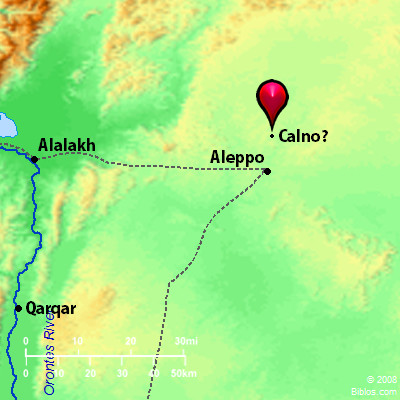Encyclopedia
CALNEHkal'-ne (kalneh; Chalanne): The name of the fourth city of Nimrod's kingdom (Genesis 10:10), the three preceding it being Babel, Erech, and Accad, i.e. the capital of the realm of Babylonia and the chief cities of three of the principal states. The meaning of the name is unknown, and many regard the identification as uncertain athers and burned C. who had fled into an outhouse with others who had set the sacred gates on fire, "the meet reward of their impiety" (2 Maccabees 8:33).
1. Identified with Nippur:
G. Rawlinson thought it to be the modern Niffer (or Noufar), comparing the Talmudic (compare Yoma') Nopher, which is said to be the same as Calneh. What place-name Calneh corresponds with in cuneiform is doubtful. Fried. Delitzsch (Wo lag das Paradies?) compared it with Kul-unu, but as we are told to pronounce this group as Kullaba, it seems unlikely that there is any connection between the two. The identification proposed by G. Rawlinson, however, may be regarded as being supported by the bilingual Creation-legend, in which Merodach (= Nimrod) is made the founder of Babylon, Erech and Nippur, which would in that case be three of the four cities mentioned in Genesis 10:10.
2. Nippur's Importance:
The inscriptions reveal to us Nippur as a city with a glorious past. Sargon of Agade, Sur-Engur, Dungi and all the more prominent kings of Babylonia in its larger sense interested themselves in the rebuilding and restoration of its renowned temples, so as to gain the favor of their great divinities.
3. Its Deities and Their Legends:
The city's earlier divine patrons were Enlil and Ninlil, the older Bel and Beltis, whose shrines were at the great temple-tower called E-kura, "the house of the land," and a poetical legend in Sumerian (dialectical) recording their visit to the city, and enumerating its sacred places, still exists (PSBA, March, 1911, 85). Later, the chief deities of the city seem to have been Ninip, the son of Enlil, and his spouse Nin-Nipri, "the lady of Nippur." These two divine beings likewise evoked the muse of the city-scribes, who dealt with the glories of the god in a composition extending over several tablets, in which his favor to his spouse Nin-Nipri is extolled; and to whom a career very similar to that of Merodach, the head of the Babylonian pantheon, is attributed (PSBA, December, 1906, 270).
4. Its Ruins Today:
The great temple-tower of Niffer, which was dedicated to the god Enlil, was a very striking object among the buildings and temples of the city, and the lower stages are still in an extremely perfect condition. Most interesting, also, are the remains of streets and houses which enable the general conditions of life in ancient Babylonia to be estimated, and suggest that they are similar to those subsisting even at the present day. Our knowledge of the city is almost entirely due to the American excavations at Niffer, inaugurated by J. P. Peters, which have been most fruitful and have shed quite a new light on the city's history. See Peters' Nippur (2 volumes, 1887); the many volumes written or edited by Professor H. V. Hilprecht under the general title The Babylonian Expedition of the University of Pennsylvania; and Professor A. T. Clay's Light on the Old Testament from Babel (Philadelphia, 1907).
T. G. Pinches
CAL'NEH, of Gen. 10:10 seems, according to the Talmud, to have been called, afterward, Nopher and is now called Niffer, a very ancient ruin 50 ms. s.e. of Babylon. It was founded by Nimrod, and probably the same as Calneh of Amos 6:2 and Calno of Isaiah 10:9 and possibly the Canneh of Ezek. 27:23.
Strong's Hebrew
H3641: Kalneha place in Babylon




